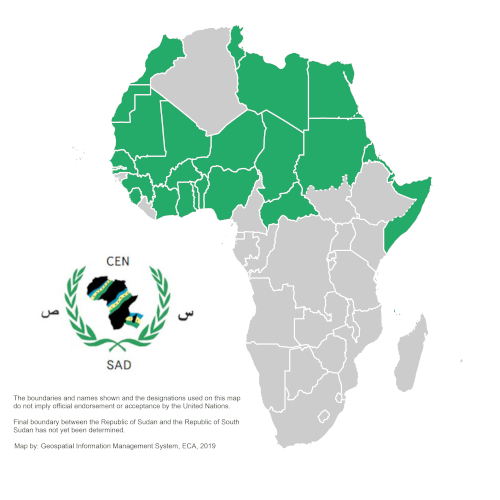CEN-SAD - The Community of Sahel-Saharan States

The Community of Sahel-Saharan States (CEN-SAD) was established on 4 February 1998, following the Conference of Leaders and Heads of States held in Tripoli, Libya. CEN-SAD became a regional economic community during the thirty-sixth ordinary session of the Conference of Heads of State and Government of the Organization of African Unity, held in Lomé, Togo, from 4 to 12 July 2000. CEN-SAD gained the observer status at the General Assembly under resolution 56/92, and thereafter, initiated cooperation agreements with numerous regional and international organizations with the purpose of consolidating collective work in the political, cultural, economic and social fields.
Since the extraordinary session of the Conference of Heads of State and Government held in N'Djamena, Chad in February 2013 whose main purpose was to endorse the restructuring and the revival of the Community, CEN-SAD approved a new Treaty prepared from the revision of the first Treaty that established the Community. The first Treaty, the Treaty Establishing the Community of Sahel-Saharan States, specified the following objectives:
(a) Establishment of a comprehensive Economic Union based on a strategy implemented in accordance with a developmental plan that would be integrated in the national development plans of the member States. It includes investment in the agricultural, industrial, social, cultural and energy fields.
(b) Elimination of all obstacles impeding the unity of its member States through adopting measures that would guarantee the following: facilitating the free movement of individuals, capital, and meeting the interest of member States citizens; freedom of residence, work, ownership and economic activity; freedom of the movement of national goods, merchandise and services; encouragement of foreign trade through drawing up and implementing an investment policy for member States; enhancement and improvement of land, air and sea transportation and telecommunications among member States through the implementation of joint projects; and, the consent of the community member States to give the citizens of member States the same rights and privileges provided for in the constitution of each member State.
(c) Coordination of pedagogical and educational systems at the various educational levels, as well as in the cultural, scientific and technical fields.
These objectives were given a new focus by the revised Treaty that emphasized two areas of deepened cooperation, namely:
- Regional security, and
- Sustainable development.
The revised Treaty will enter into force, in accordance with article 53, after fifteen ratifications have been completed. To date, thirteen member States have ratified the Treaty[1]. The organizational structure of CEN-SAD under the revised Treaty consists of the following organs and Institutions:
- The Conference of Heads of State/Government
- The Executive Council
- The permanent Peace and Security Council
- The permanent Council in charge of Sustainable Development
- The Committee of Ambassadors and Permanent Representatives
- The General Secretariat
- The Economic Social and Cultural Council (ESCC)
- The Sahel-Sharan Bank for Investment and Trade
The member States of CEN-SAD are: Benin, Burkina Faso, Central African Republic, Chad, the Comoros, Côte d’Ivoire, Djibouti, Egypt, Eritrea, the Gambia, Ghana, Guinea-Bissau, Libya, Mali, Mauritania, Morocco, Niger, Nigeria, Senegal, Sierra Leone, Somalia, the Sudan, Togo and Tunisia.

Selected regional indicators for CEN-SAD (2014) [2] | |
GDP | $1,350.7 billion |
GDP per capita | $1,363.8 |
Area (sq. km) | 14.3 million sq. km |
Total population | 553 million |
Total imports | $312.1 billion |
Total exports | $244.3 billion |
The headquarters of CEN-SAD
Tripoli, Libya.
CEN-SAD Secretariat,
Place d’Algeria, P.O. Box 4041
Fax : +218 21 3346854
Tel: +218 21 3614832, +218 21 3614832
E-mail: censad_sg@yahoo.com
Web: http://www.censad.org.
[1] The following thirteen (13) member States have ratified the revised Treaty: Mali, Morocco, Niger, Sudan, Burkina Faso, Côte-d'Ivoire, Djibouti, Eritrea, Guinea, Benin, Chad, Senegal, and Togo.
[2] The figures include Guinea, Kenya, Liberia and Sao Tome and Principe that are no longer members of CEN-SAD. See http://unctadstat.unctad.org/EN/Index.html. Accessed on 1 July 2016.